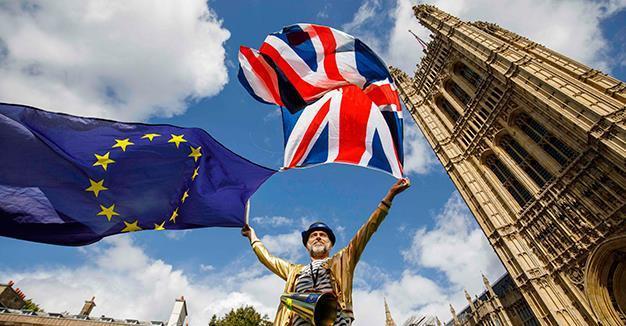Britain must stay in EU’s single market after Brexit: Labor MPs
LONDON - Reuters
 Britain’s main opposition Labor Party must commit to staying in the European Union’s single market after Brexit and put an end to Prime Minister Theresa May’s “destructive Brexit,” several of its lawmakers said on Sept. 24.
Britain’s main opposition Labor Party must commit to staying in the European Union’s single market after Brexit and put an end to Prime Minister Theresa May’s “destructive Brexit,” several of its lawmakers said on Sept. 24.At the beginning of the party’s annual conference, Labor lawmakers and trade union leaders wrote an open letter to their leader, calling on Jeremy Corbyn to “go further” than his current position to press for being part of the single market during any transition after Britain leaves in March 2019.
After months of sticking to a position little different from the governing Conservative Party’s pursuit of a clean break with the EU, Labor changed tack last month by saying, if in power, the party would press for full access to the single market during a transition - something that could continue beyond.
“We have watched with dismay as the government has used a narrow referendum result to justify an extreme approach to Brexit,” the lawmakers said in a letter published in Britain’s Observer newspaper.
“So at our conference this week, Labor should commit to staying in the Single Market and Customs Union - ruling out no options for how to achieve this.”
Labor’s earlier move was aimed at increasing pressure on May, weakened after losing her party’s majority in parliament in a June election she did not need to call and struggling to unite her own party over Brexit.
But Labor is also keenly aware that many of its supporters, especially in northern and central England, voted for Brexit and want controls on immigration which many blame for stretching public services, such as hospitals and schools.
Corbyn, who says he is preparing for government, told the BBC he was listening to those members of the Labor Party who want to keep the closest possible ties with the EU, but he did not say whether he would change the party’s policy.
Instead, he said he believed a transitional period with full single market access should last for as long as is necessary and offered some support for continued migration.
In the letter, Labor lawmakers attacked the Conservative Party’s “damaging promise to cut net migration to the tens of thousands.”
“Labor must be clear: migrants are not to blame for falling wages, job insecurity, bad housing and overstretched public services,” the letter said.
UK ‘to diverge from EU regulations’
Meanwhile, British Brexit minister David Davis said on Sept. 24 Britain’s rules and regulations will diverge from those set by the European Union after Brexit because the government “will do things our own way”.
As a member of the EU, Britain must meet the rules and regulations of the bloc to have full access to the single market and frictionless trade.
“We start at the same position, but we will manage the divergence,” Davis told the BBC’s Andrew Marr television show.
“Of course we will diverge, we will do things our own way.”
Moody’s downgrades Britain debt rating on Brexit uncertainties
Moody’s cut Britain’s long-term credit rating on Sept. 22, citing economic uncertainty sparked by complex Brexit negotiations and the likelihood of weaker public finances.
The ratings agency cut the debt grade one notch to Aa2 from Aa1 with a stable outlook, which reflects expectations Britain’s debt will “continue to rise,” and worries that whatever trade agreement is reached with the European Union, even a “best-case scenario would not award the same access to the EU... that the U.K. currently enjoys.”
Moody’s predicted “weaker public finances going forward” as the government boosts welfare spending after several years of cuts and Prime Minister Theresa May’s parliamentary coalition faces pressure to make good on promises to boost spending for Northern Ireland.
The ratings agency also expects Brexit and the loss of access to the single market to weigh on growth, saying it is “no longer confident that the U.K. government will be able to secure a replacement free trade agreement with the EU which substantially mitigates the negative economic impact of Brexit.”
The downgrade came hours after May, in a major address in Italy, vowed that Britain would largely maintain its current ties with Brussels ahead of a fourth round of negotiations with the European Commission next week.
The pound fell on the speech, which critics said did too little to clarify matters.
“Overall, there was very little detail or progress in this speech, with a risk of continued uncertainty among businesses and investors,” Barclays said in a note.
“Any continued delay in next week’s negotiations may in turn dampen sentiment and the future investment and growth outlook.”
















